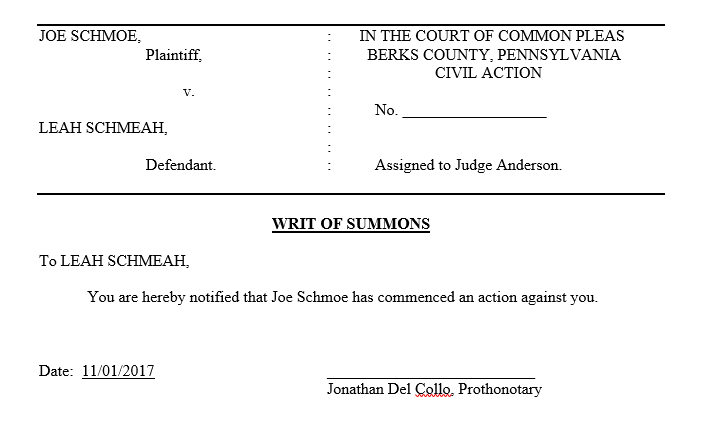What is a Writ of Summons in Pennsylvania, and how should I respond to one?

A Writ of Summons is an alternate form of original process in the Commonwealth of Pennsylvania.
A Writ of Summons is an unusual mechanism in the Commonwealth of Pennsylvania that allows a Plaintiff (the individual or company who is bringing a lawsuit) to start their lawsuit against a Defendant without filing a Complaint. Typically, lawsuits begin with a Complaint which lays out all of the grounds on which the lawsuit is being filed including specific allegations of wrongdoing. The Complaint must be specific enough to raise the issues complained of so that the Defendant can respond in an Answer and defend themselves in the lawsuit.
However, a Writ of Summons is a second way that an individual can initiate legal proceedings in Pennsylvania. Most states do not provide anything quite like the Writ of Summons. The Writ of Summons only has to identify the parties, and then must be served on the Defendant.
You can watch this video for more information, or continue reading below.
The Writ of Summons is frequently used where a Plaintiff believes that he or she has grounds for a lawsuit but is not entirely sure how to prove some of the allegations against the Defendant. In this case, a Writ of Summons can be filed and pre-Complaint discovery can be requested from the Court which allows the Plaintiff to find information to support their allegations. For example, if a woman believes she was fired because of her gender, she may not be able to prove this right away; however, if she files a Writ of Summons and requests pre-Complaint discovery, she and her attorney may be able to require depositions of high ranking personnel within the corporation that fired her, or find emails or other documents that could assist in proving her allegation.
Recent statistics demonstrate that, in some counties of Pennsylvania, writs of summons begin more than half of all lawsuits. In other words, this is not a rare occurrence. Writs of Summons have legitimate uses, including preserving the statute of limitations while parties finalize negotiations, allowing for pre-complaint discovery and for other purposes. Unfortunately, some Plaintiffs use the Writ of Summons to avoid explaining their lawsuit, or even to trick a potential defendant into missing the Complaint when filed.
What Should I do If I Receive a Writ of Summons?
So, what should you do if you receive a Writ of Summons? You’re faced with two options. The first is to ignore the writ of summons, but keep an eye on the docket opened in the case and see if a Complaint is filed. A complaint will not have to be served on you since you’re already received the writ of summons. The second option, which is better in most cases, is to file a Praecipe to File a Complaint. A Praecipe to File a Complaint will force the Plaintiff to file a Complaint within 20 days or face dismissal of the lawsuit.
You might wonder why you would force them to move the lawsuit forward. After all, forcing the filing of a Complaint will also trigger your duty to answer the lawsuit’s allegations. The short answer is that forcing the Plaintiff to file a Complaint will deprive them of the advantage they sought in filing a writ of summons in the first place. Plaintiffs file a writ of summons to avoid having to lay out allegations immediately. Forcing the Plaintiff to do so keeps them on the defensive at the start.
Is There Any Danger in Ignoring a Writ of Summons?
To initiate a lawsuit, an individual must serve process on the Defendant they are suing. This service usually involves the county sheriff showing up and handing the documents to the Defendant. This places the Defendant on notice that they are being sued. A Writ of Summons must be served upon the Defendant; however, once a Writ of Summons has been filed, other documents may simply be mailed to the Defendant’s address. In some cases, Defendants miss the documents mailed to them, and if they miss a Complaint for 30 days, they risk having a default judgment entered against them. This means that all of the allegations in the Complaint are deemed by the Court to be true. Accordingly, once a Writ of Summons has been filed against the Defendant, it is typically wise to force the Plaintiff to file a Complaint and then to file an Answer. In other circumstances, it may be appropriate to reach out to the party who filed the Writ of Summons to see if some grounds for compromise can be reached.
Conclusion
If you have been served with a Writ of Summons in Pennsylvania, you should seek legal counsel and consider what your options are to move the case forward. In some cases, you may be able to compromise the claim, while in others, it may be appropriate to file a Praecipe to File a Complaint. Call us today to discuss your options in defending your lawsuit.
